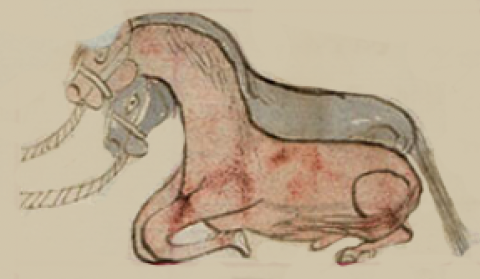caballo (CST20)
This painting of the simplex glyph for the term caballo (horse, a loanword from Spanish) actually shows two horses, side by side, both in profile, facing toward the viewer’s left. The horse closest to the viewer is reddish, and the one in the back is gray. They both have tackle and leads.
Marc Thouvenot has a vignette from the Códice Durán where Spaniards ride horses, which might be useful for comparing the kind of detail tlacuilos could show for horses: https://vignettes.sup-infor.com/imagen/2-DU_01_204_v_a.
Stephanie Wood
The companion text explains that these horses were purchased for the use of the community. Long ago, horses existed in the Americas, but seem to have been reintroduced by Europeans in the sixteenth century. Indigenous people quickly sought to own and ride horses. In the first decades after colonization, they had to petition for such permissions. For more on the Codex Sierra, see Kevin Terraciano’s study (2021), esp. pp. 113 and 149.
Stephanie Wood
ome cavallos
ome caballos
Stephanie Wood
1550–1564
Jeff Haskett-Wood
caballos, aparejos

caballo, a horse (loanword from Spanish), https://nahuatl.wired-humanities.org/content/caballo
caballo
Stephanie Wood
Códice Sierra-Texupan, plate 20, page dated 1558. Origin: Santa Catalina Texupan, Mixteca Alta, State of Oaxaca. Kevin Terraciano has published an outstanding study of this manuscript (Codex Sierra, 2021), and in his book he refers to alphabetic and “pictorial” writing, not hieroglyphic writing. We are still counting some of the imagery from this source as hieroglyphic writing, but we are also including examples of “iconography” where the images verge on European style illustrations or scenes showing activities. We have this iconography category so that such images can be fruitfully compared with hieroglyphs. Hieroglyphic writing was evolving as a result of the influence of European illustrations, and even alphabetic writing impacted it.
https://bidilaf.buap.mx/objeto.xql?id=48281&busqueda=Texupan&action=search
The Biblioteca Digital Lafragua of the Biblioteca Histórica José María Lafragua in Puebla, Mexico, publishes this Códice Sierra-Texupan, 1550–1564 (62pp., 30.7 x 21.8 cm.), referring to it as being in the “Public Domain.” This image is published here under a Creative Commons license, asking that you cite the Biblioteca Digital Lafragua and this Visual Lexicon of Aztec Hieroglyphs.



